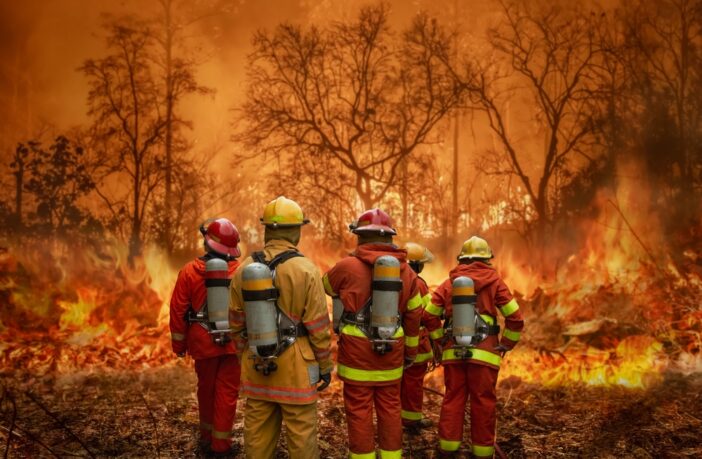As southern Europe and parts of the USA and Asia sizzle in unbearable record-breaking heat, Dr Kevin Collins, senior lecturer in the environment and systems, from The Open University gives a stark warning – there’s no simple fix to the variation in climate change, only improved management.

Dr Kevin Collins
While the UK isn’t frying it’s just a matter of time before our food, energy and water supplies are under increased pressure. But we can do better to manage those climate-change variations.
Forecasters say the hottest place on Earth is soon likely to break its own 110 year-old temperature record of over 56.7C – Death Valley in California.
And it’s not the only place suffering. The wildfires in Rhodes and also Corfu have led to mass evacuations of towns and tourist resorts as hotels burn and smoke affects populated areas. Elsewhere in Greece day-time temperatures are regularly exceeding 35C, and only falling to 25C at night. Italy has had red heat alerts for all of its 23 major cities.
In the USA, a heatwave in the south-western states has hit cities like Las Vegas and pushed temperatures above 35C for over 14 consecutive days in Arizona. Official measurements are shade temperatures – it will be a lot hotter in direct sunshine.
Those travelling abroad this year and in future will have to adapt the timings of holidays, thechoice of destinations and daily routines to cope with extremes.
Famous tourist sites may close more often due to heat extremes – just as the Acropolis did in Greece recently. Activities and excursions may only happen in mornings and evenings and some resorts may close completely due to fire risks.
The impact in the UK
Why do events happening a long way off matter to the UK? The disruption to holidays is a very immediate impact, but there are many less obvious ways this matters to our daily lives in the UK. Only half the food on your plate is from here, the rest is imported including meat, carrots, tomatoes, bananas and tea.
Climate change-related heatwaves, droughts and floods in other countries like Spain, India and Latin America will deplete their harvests, reducing availability on global markets and pushing up food prices in UK shops.
Even here, wheat harvests have reduced by between 7-20% over the past five years because of heatwaves and drought.
A rethink is needed on management of food, energy and water
All of these changes mean we need to rethink how we manage food, energy and water systems. The stark fact is variation produced by climate change means there is no single solution.
Let me repeat that: there is no single solution to climate change. Climate change brings variation and variation cannot be ‘solved’, but it can be managed.
It’s not possible to say the recent heatwaves are definitively down to climate change but it is expected to bring increased variability in weather.
Sometimes it’ll be extra hot. Days later, very wet, or sometimes just hot, hot, hot followed by cool and wet. It’s the unpredictable variation that makes adaptation with climate change so challenging.
Power cuts are a real threat
As everyone in Europe reaches to turn on their newly installed air conditioning, demand for electricity can exceed supply resulting in power cuts for domestic and commercial uses.
This means less available energy to share ‘spare’ energy across Europe and the UK through the interconnector grid. That’s already happening.
In 2022, Norway almost ‘ran out’ of spare electricity as its hydropower output fell due to prolonged drought. In the UK, we’re adding to electricity demand with increasing electric-car ownership and installation of domestic air conditioning.
As high summer temperatures and droughts become more normal in Europe and the UK, we will be more reliant on the UK’s own energy generation to meet increased demand during weather extremes.
Our demand for water will increase and that’s a problem
As temperatures climb, so does water demand and despite efficiencies, humans keep finding ways to use more.
The European heatwave increases abstraction from rivers and groundwater for irrigation and domestic use putting pressure on rivers and the species that live there.
In the UK, those imported fruit and vegetables on your plate are mostly water – and it’s all from the water supply and river systems of other countries.
We are already seeing changes. This year, Scotland – famous for its rain and mists – has been considerably drier than the south of England and many Scottish rivers are at below-average levels.
Changing fish stocks could be a real issue
In the Atlantic Ocean, unusually warm water has moved northwards and spread over a vast area along the coast of Spain, France and western coasts of the UK.
Temperature increases of 3 to 5C above normal represent a huge amount of extra energy and heat being moved around our seas and coasts.
That heat can cause changes in the chemical balance of the sea and change currents, affecting our fish stocks and marine life and generally contributing to accelerated warming of the artic regions of the northern hemisphere.
All of these more unpredictable variations mean we need to rethink how we manage food, energy and water. While trying to reduce your carbon footprint is a good idea, it’s not the only thing you can do. Reducing your food waste, energy and water use will all help to develop resilience to climate change in the UK and abroad.
Through our daily choices, we are currently managing climate change, we just need to do it differently and better.
Main picture: Shutterstock



